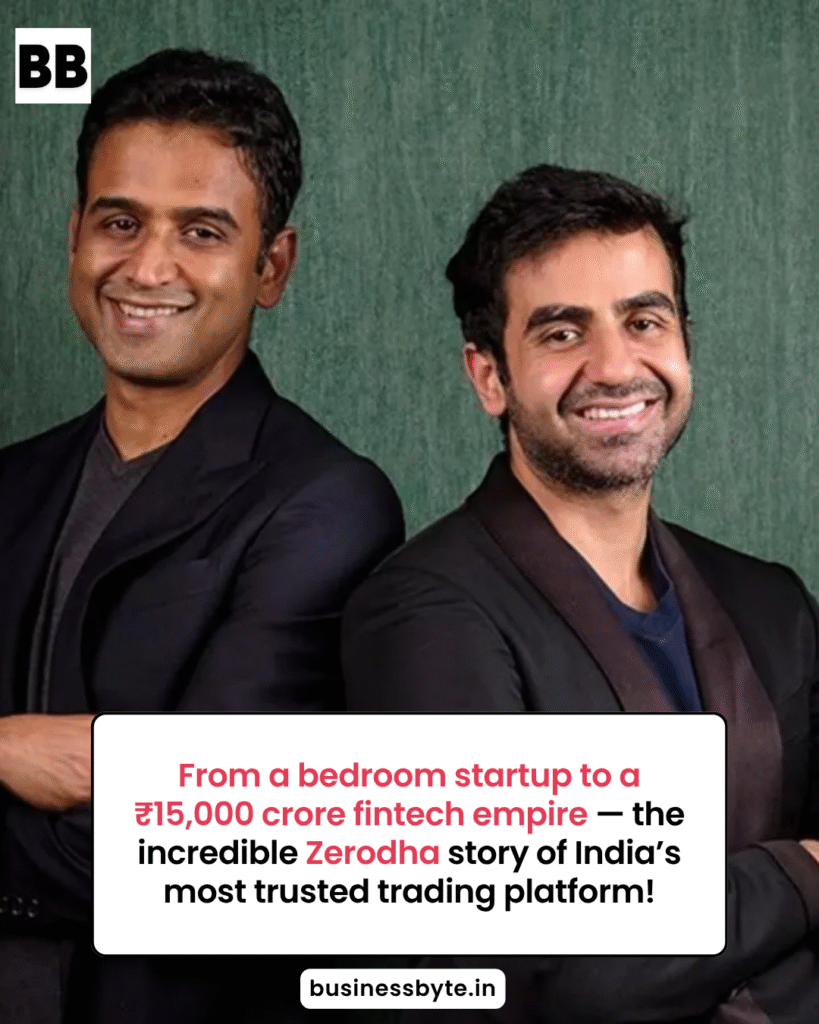In 2010, Nithin Kamath (26) and Nikhil Kamath (22), two brothers from Bengaluru, set out to disrupt India’s complex, fee-heavy stock trading ecosystem. With just ₹30 lakh from personal savings, they launched Zerodha, a discount brokerage built on one radical promise — simplify investing for everyone.
What began in a small bedroom office with basic laptops would go on to become India’s largest stock brokerage, serving 10 million clients and valued at an astounding ₹15,000 crore — all without a single rupee of external funding.
The idea for Zerodha was born out of Nithin’s own frustrations as a trader. High brokerage fees, opaque charges, and clunky trading interfaces were keeping young investors out of the market. Together with his brother Nikhil, he envisioned a tech-first platform that offered low-cost, transparent, and user-friendly trading for India’s growing base of digital-savvy investors.
Using free online coding resources and open-source tools, they developed the initial version of Zerodha on personal laptops. There were no offices, no marketing budgets — only long nights, constant testing, and relentless focus on user experience. They tested early versions among friends and family, building a product that felt refreshingly simple in a world of jargon.
When Zerodha officially launched in August 2010, it offered zero brokerage on equity delivery — a first in India. The move resonated with young traders and first-time investors who had long been priced out by traditional brokers.
Growth was entirely organic. With no advertising spend, the Kamaths relied on referrals, online communities, and transparency to spread the word. By the end of the first year, Zerodha had 1,000 clients — mostly retail traders who appreciated its honesty and tech-first approach.
As India’s internet and mobile penetration exploded, so did Zerodha’s user base. The company’s flagship platform Kite, launched in 2015, simplified trading with a sleek interface and powerful tools, bringing investing to the fingertips of millions. By that year, Zerodha had crossed 1 lakh users.
While competitors chased funding and flashy marketing, Zerodha remained profit-focused and bootstrapped, growing steadily through trust and efficiency. The Kamath brothers also reinvested profits to build an ecosystem of financial education and community engagement — including Varsity, one of India’s largest free learning platforms for market education.
By 2024, Zerodha had cemented its position as India’s largest retail broker, handling over 15% of daily trading volumes across NSE, BSE, and MCX. The company’s valuation touched ₹15,000 crore, driven purely by profitability and customer loyalty — a rare feat in the startup world.
Zerodha’s success is not just about technology or timing — it’s about democratizing finance. By removing barriers, simplifying trading, and empowering individual investors, the Kamaths built more than a company — they built a movement for financial inclusion in India’s capital markets.
As of 2025, Zerodha continues to lead through innovation, with ventures like Rainmatter, an investment fund supporting Indian fintech startups, and True Beacon, a wealth management arm led by Nikhil.
From a modest bedroom office to a fintech empire, Zerodha’s journey proves that transparency, technology, and trust can outperform even the biggest VC-backed giants.
In the age of overfunded startups, the Kamath brothers’ story stands as a powerful reminder: you don’t need to raise millions to make millions — you just need conviction and clarity.
Last Updated on: Thursday, October 16, 2025 5:57 pm by Business Byte Team | Published by: Business Byte Team on Thursday, October 16, 2025 5:57 pm | News Categories: Startups
